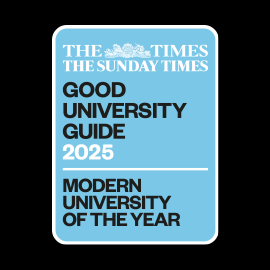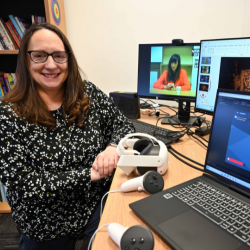-
Study
-
Quick Links
- Course Search
- Fees and Funding
- Unlock Your Potential
- Still time to Apply
- Higher and Degree Apprenticeships
- Continuing Professional Development
- Still time to apply
-
Undergraduate
- Application Guides
- UCAS Exhibitions
- Foundation Years
- School & College Outreach
- Information for Parents
-
Postgraduate
- Application Guide
- Postgraduate Research Degrees
- Flexible Learning
- Change Direction
- Register your Interest
-
-
International
International
Northumbria’s global footprint touches every continent across the world, through our global partnerships across 17 institutions in 10 countries, to our 277,000 strong alumni community and 150 recruitment partners – we prepare our students for the challenges of tomorrow. Discover more about how to join Northumbria’s global family or our partnerships.
View our Global Footprint-
Quick Links
- Course Search
- Undergraduate Study
- Postgraduate Study
- Information for Parents
- London Campus
- Northumbria Pathway
- Cost of Living
- Sign up for Information
-
International Students
- Information for Students
- International Events
- Application Guide
- Entry Requirements and Education Country Agents
- Global Offices
- English Requirements
- English Language Centre
- International student support
- Cost of Living
-
International Fees and Funding
- International Undergraduate Fees
- International Undergraduate Funding
- International Masters Fees
- International Masters Funding
- International Postgraduate Research Fees
- International Postgraduate Research Funding
-
International Partners
- Agent and Representatives Network
- Global Partnerships
- Global Community
-
International Mobility
- Information for Northumbria Students
- Information for Incoming Exchange Students
-
-
Business
Business
The world is changing faster than ever before. The future is there to be won by organisations who find ways to turn today's possibilities into tomorrows competitive edge. In a connected world, collaboration can be the key to success.
More on our Business Services -
Research
Research
Northumbria is a research-rich, business-focused, professional university with a global reputation for academic quality. We conduct ground-breaking research that is responsive to the science & technology, health & well being, economic and social and arts & cultural needs for the communities
Discover more about our Research -
About Us
-
About Northumbria
- Our Strategy
- Our Staff
- Place and Partnerships
- Leadership & Governance
- Academic Departments
- University Services
- History of Northumbria
- Contact us
- Online Shop
-
-
Alumni
Alumni
Northumbria University is renowned for the calibre of its business-ready graduates. Our alumni network has over 246,000 graduates based in 178 countries worldwide in a range of sectors, our alumni are making a real impact on the world.
Our Alumni - Work For Us
What will I learn on this module?
You will learn a broad range of basic concepts and principles of the physical environment, how these interact as part of the Earth System and are modified by human processes. As you explore the Earth System today and in the past, you will discover a diverse range of atmospheric, land based and oceanic components that together form the physical environment. Armed with this knowledge you will be able to begin to critically evaluate the evidence concerning processes, landforms and systems. This will develop your problem solving skills and give you an international holistic view on the Earth as a system. Topics include:
• Atmospheric processes and energy flows.
• Climate and climate change.
• The world’s oceans, their physical properties and interactions with the climate and coastal populations.
• Weathering and Erosion.
• Soils and soil forming processes.
• Glacial and periglacial environments and the processes that shape these.
• Landscape and landform evolution from hillslope processes, to rivers and the coastal environment.
• The biogeographical distribution of vegetation and biomes
• The role of the biosphere in the Earth system and ecosystem engineers.
• How the Earth system has changed over Quaternary and Cenozoic time scales.
• The physical environment and links to human health.
How will I learn on this module?
You will learn through lectures and independent learning. The lectures will cover the key definitions, theories, concepts, applications and processes that will give you the background knowledge to undertake the guided independent reading. Using the Electronic Learning Platform and a dedicated electronic reading list you will broaden your understanding of the Earth system that will enable you to confidently apply this to the other modules during your degree programme.
How will I be supported academically on this module?
Support will be provided through:
• Formal lectures on components of the Earth System
• Practice tests designed for each topic block on the module
• Feedback on exams enabling you to improve your preparation/revision techniques and performance
• Open door policy for students for access to staff.
• Access to all learning materials (lecture slides, practical materials, online resources, electronic reading lists) via eLP.
Teaching staff operate an ‘open door’ policy for students meaning you can approach them anytime during normal office hours, or via email, to answer questions, receive feedback and support your learning on the module.
What will I be expected to read on this module?
All modules at Northumbria include a range of reading materials that students are expected to engage with. Online reading lists (provided after enrolment) give you access to your reading material for your modules. The Library works in partnership with your module tutors to ensure you have access to the material that you need.
What will I be expected to achieve?
Knowledge & Understanding:
• MLO 1: Describe, discuss and explain a broad range of Earth System components and processes over varying time scales.
• MLO 2: Explain how human activities interact with the Earth System and how these modify processes in the modern world.
Intellectual / Professional skills & abilities:
• MLO 3: Develop independence in learning through guided reading and use of feedback from exams.
Personal Values Attributes (Global / Cultural awareness, Ethics, Curiosity) (PVA):
• MLO 4: Develop informed concern about the Earth and its people through an awareness of human modifications and impacts to the physical environment
How will I be assessed?
The module is assessed by one multiple choice exam held at the end of the semester.
Your tutors will be looking for, and developing, your knowledge of the Earth System both from the lectures provided and from the guided independent study. During the semester and well before the exam you will have the opportunity to participate in a series of practice tests available on the eLP. The module leader will provide formative feedback to the whole group and you will have the opportunity to speak to module tutors on topics that you found challenging. With this support you will develop your academic abilities and confidence in applying your knowledge, and be in a good position to successfully complete the final exam. (MLOs 1,2,3 & 4)
Pre-requisite(s)
None
Co-requisite(s)
None
Module abstract
In this module you will learn about the Earth from a holistic perspective. The module will cover a broad range of topics in physical geography that will culminate in giving you a deeper understanding of the interrelated nature of natural processes and systems operating on Earth today, and in the past. The module will also cover human interactions and impacts on natural systems and processes and facilitate you to develop an informed concern about the Earth and its people. As one of the core Level 4 modules you will interact with a team of research active staff, which will introduce you to research-rich learning at Northumbria University, provide you with the background knowledge and confidence to apply this to all other modules you will study.
Course info
UCAS Code L700
Credits 20
Level of Study Undergraduate
Mode of Study 3 years Full Time or 4 years with a placement (sandwich)/study abroad
Department Geography and Environmental Sciences
Location City Campus, Northumbria University
City Newcastle
Start September 2025 or September 2026
All information is accurate at the time of sharing.
Full time Courses are primarily delivered via on-campus face to face learning but could include elements of online learning. Most courses run as planned and as promoted on our website and via our marketing materials, but if there are any substantial changes (as determined by the Competition and Markets Authority) to a course or there is the potential that course may be withdrawn, we will notify all affected applicants as soon as possible with advice and guidance regarding their options. It is also important to be aware that optional modules listed on course pages may be subject to change depending on uptake numbers each year.
Contact time is subject to increase or decrease in line with possible restrictions imposed by the government or the University in the interest of maintaining the health and safety and wellbeing of students, staff, and visitors if this is deemed necessary in future.
Useful Links
Find out about our distinctive approach at
www.northumbria.ac.uk/exp
Admissions Terms and Conditions
northumbria.ac.uk/terms
Fees and Funding
northumbria.ac.uk/fees
Admissions Policy
northumbria.ac.uk/adpolicy
Admissions Complaints Policy
northumbria.ac.uk/complaints









